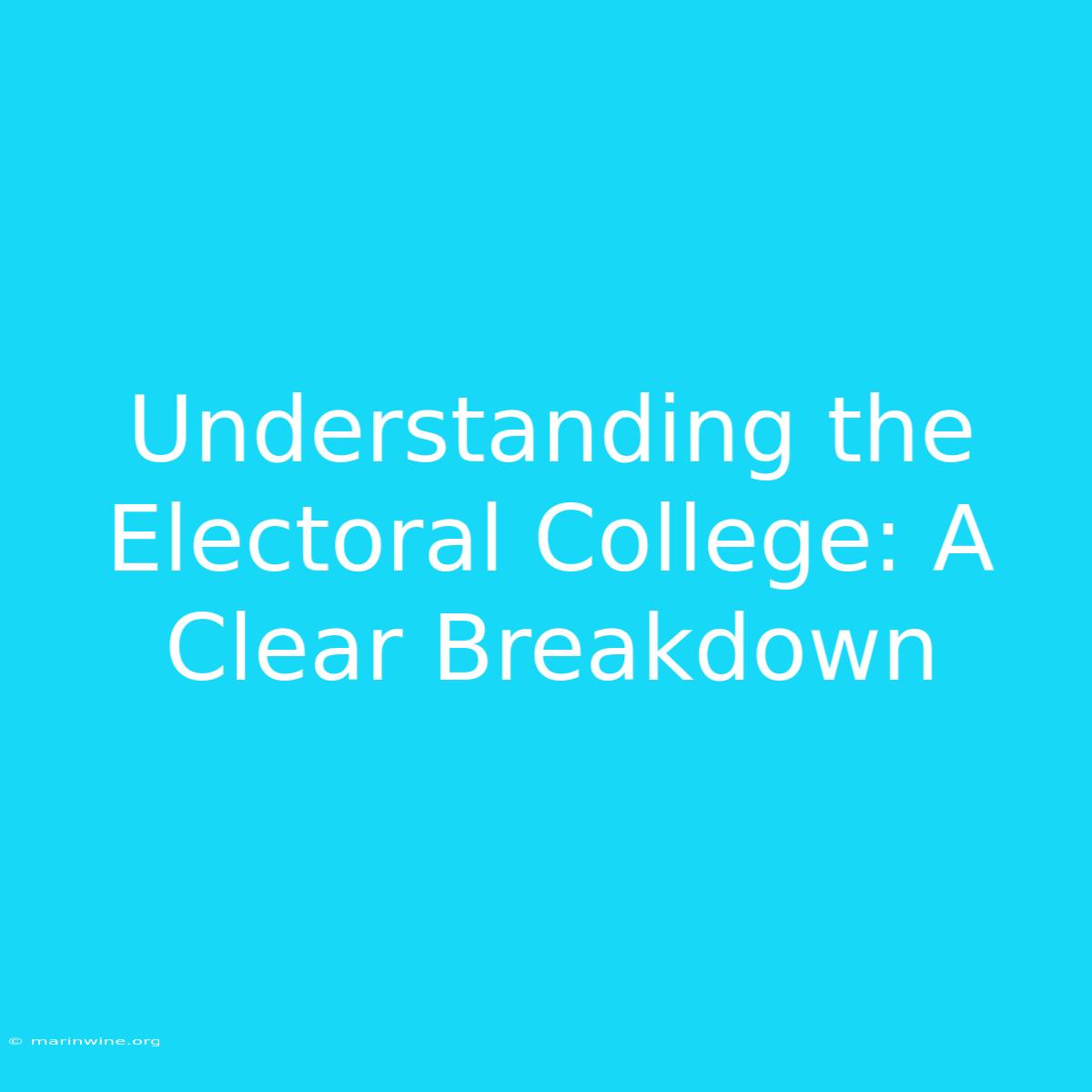Understanding the Electoral College: A Clear Breakdown
Is the Electoral College a fair system? Many argue that it isn't, and its complexities often leave voters confused. This article aims to provide a clear and concise explanation of the Electoral College system, addressing its purpose, mechanics, and ongoing debates.
Why It Matters: Understanding the Electoral College is crucial for every American citizen. It's the system that determines the President of the United States, and its nuances can significantly impact the outcome of elections. A grasp of its history, function, and controversies allows for more informed civic engagement.
Key Takeaways of Electoral College
| Feature | Description |
|---|---|
| Purpose | To ensure representation of all states, not just heavily populated areas. |
| Mechanics | Electors are chosen based on each state's population, with each state receiving the same number of electors as its members in Congress. |
| Winner | Candidate with a majority of Electoral College votes (at least 270) wins the presidency. |
| Criticisms | Potential for a candidate to win the popular vote but lose the election, lack of direct representation, and potential for "faithless electors". |
| Alternatives | National popular vote, proportional allocation of Electoral Votes, direct election. |
The Electoral College
The Electoral College is a system established by the Founding Fathers to elect the President of the United States. Its primary goal was to strike a balance between the interests of large and small states, ensuring that no single state or region would hold disproportionate power.
Key Aspects
- Electors: Each state has a number of electors equal to its total number of senators (two) and representatives in the House of Representatives. The District of Columbia also receives three electors.
- Winner-Take-All System: In most states, the candidate who wins the popular vote receives all of the state's electoral votes, regardless of the margin of victory. This is known as the "winner-take-all" system.
- Electoral Votes Required: A candidate needs to win at least 270 electoral votes out of a total of 538 to become President.
The Winner-Take-All System
The "winner-take-all" system is a key feature of the Electoral College and a source of significant debate. While it ensures the winner has a majority of electoral votes, it can also lead to situations where a candidate wins the popular vote nationwide but loses the election. This occurred in 2000 and 2016, further fueling criticisms of the Electoral College.
Criticisms and Alternatives
The Electoral College faces numerous criticisms, including:
- Disproportionate Influence of Small States: The system gives smaller states disproportionate power because each state receives two electoral votes for its senators, regardless of population.
- Potential for "Faithless Electors": Electors are technically not bound to vote for the candidate who wins the popular vote in their state. While this rarely occurs, it highlights a potential vulnerability in the system.
- Unfairness to Minority Votes: In states where the outcome is predictable, voters in the minority party may feel their votes don't matter, as their state's electoral votes are already decided.
Several alternatives to the Electoral College have been proposed, including:
- National Popular Vote: This system would award the presidency to the candidate who receives the most popular votes nationwide.
- Proportional Allocation of Electoral Votes: Each candidate would receive a share of a state's electoral votes proportionate to the percentage of the popular vote they received in that state.
- Direct Election: The President would be elected directly by the people, eliminating the Electoral College entirely.
FAQ
- Q: Why was the Electoral College created? A: The Electoral College was designed to address concerns about the influence of large states and to ensure that all states were represented in the process of electing the President.
- Q: How can a candidate win the popular vote but lose the election? A: This can happen because of the "winner-take-all" system in many states. A candidate could win more popular votes nationwide but lose in key states with a large number of electoral votes.
- Q: What are the arguments for keeping the Electoral College? A: Supporters argue that it preserves the balance of power between states, prevents candidates from focusing solely on heavily populated areas, and encourages candidates to campaign in all parts of the country.
- Q: What are the arguments against keeping the Electoral College? A: Critics argue that it is undemocratic, undermines the principle of "one person, one vote," and can lead to inaccurate results.
- Q: What is the future of the Electoral College? A: The Electoral College is a contentious issue, and its future remains uncertain. Continued debate and potential reforms are likely.
Tips for Understanding the Electoral College
- Follow news coverage: Stay informed about the Electoral College and its impact on elections.
- Engage in discussions: Discuss the Electoral College with friends, family, and community members to gain different perspectives.
- Research candidates' positions: Understand how candidates' positions on the Electoral College might affect their policies.
- Contact your representatives: Express your views on the Electoral College to your elected officials.
Summary
The Electoral College is a complex system that plays a crucial role in American elections. Its history, mechanics, and ongoing debates make it an important topic for every citizen to understand. By engaging with the issues and participating in the political process, individuals can contribute to a more informed and engaged citizenry.
Closing Message: The Electoral College is a topic that sparks passionate debate and raises crucial questions about democracy and representation. By understanding its intricacies and staying informed, we can continue to work towards a more democratic and representative system of governance.

